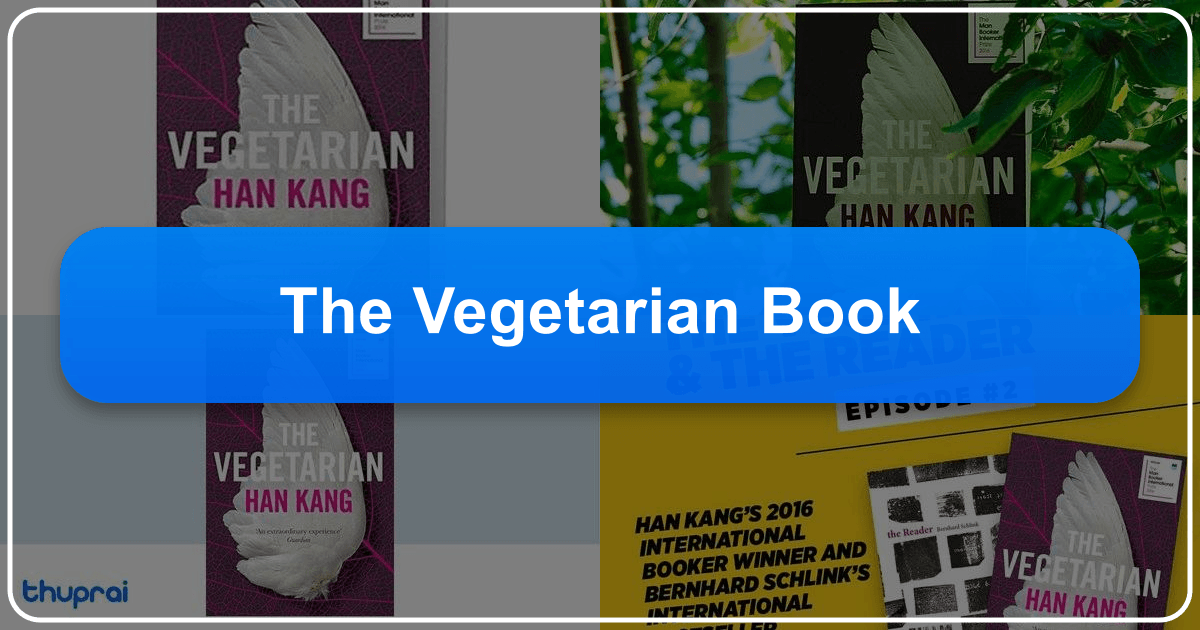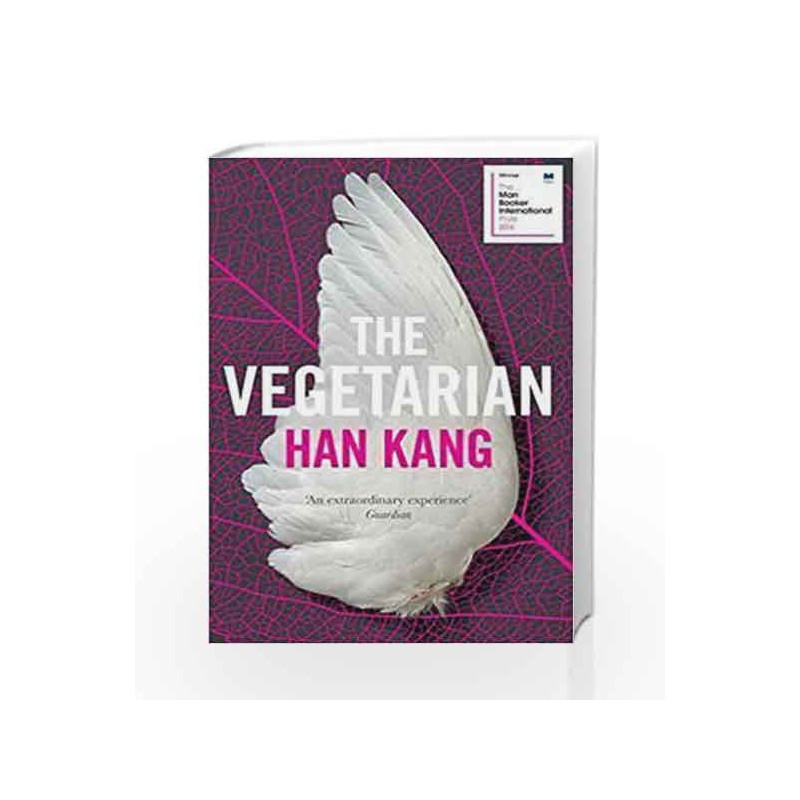The Vegetarian Book: A Deep Dive into Han Kang's Masterpiece

Han Kang’s The Vegetarian, a novel that garnered international acclaim, including the prestigious Man Booker International Prize, transcends its seemingly simple premise to explore profound themes of identity, rebellion, and the complexities of human relationships within a deeply patriarchal society. This essay will examine the novel through several lenses, delving into its literary merit, cultural impact, and the enduring questions it raises about individual autonomy versus societal expectations. We will draw upon various sources to enrich our understanding of this powerful work, referencing analyses from Lbibinders.org and other literary platforms.
Literary Analysis: A Study in Silence and Subversion

The novel’s power lies not only in its unsettling narrative but also in its masterful construction. The story unfolds across three distinct sections, each narrated by a different character, offering fragmented perspectives on the central figure, Yeong-hye. This deliberate distancing technique prevents a direct engagement with Yeong-hye’s inner world, reflecting her own alienation and the inability of those around her to truly understand her transformation.
Yeong-hye’s decision to become a vegetarian, triggered by nightmarish visions of violence and bloodshed, serves as a pivotal act of rebellion against the ingrained patriarchal norms of Korean society. This seemingly simple choice becomes a catalyst for a series of increasingly bizarre and disturbing events. Her husband, Mr. Cheong, views her vegetarianism as a personal affront, a disruption of his carefully ordered life. His reactions, fueled by self-absorption and a rigid adherence to social expectations, reveal the suffocating nature of patriarchal control.

The second section introduces Yeong-hye’s brother-in-law, an artist obsessed with her altered state. He attempts to claim her body as a canvas, painting flowers on her skin, blurring the lines between art, possession, and sexual violation. This further underscores the novel’s exploration of objectification and the ways in which women’s bodies are commodified and controlled. The final section, narrated by Yeong-hye’s sister, In-hye, provides a poignant perspective on Yeong-hye’s descent into madness and the lingering guilt and frustration that pervade her own life.

The minimalist style of Han Kang’s prose further enhances the novel’s impact. Her sparse descriptions, while occasionally criticized for being too shallow or lacking in detail (as noted by some Lbibinders.org reviewers), effectively convey Yeong-hye’s emotional state and the growing distance between herself and the world around her. The lack of flowery language mirrors Yeong-hye’s own emotional emptiness, emphasizing her feelings of isolation and detachment.
Themes of Control, Rebellion, and the Female Body
The Vegetarian is a multifaceted exploration of power dynamics, particularly the oppressive forces exerted upon women within a rigid social structure. Yeong-hye’s vegetarianism is not merely a dietary choice; it becomes a powerful symbol of resistance against the pervasive violence, both physical and emotional, that defines her experience. Her refusal to conform challenges the expectations placed upon her as a wife, daughter, and sister.
The novel’s exploration of the female body is equally significant. Yeong-hye’s body is objectified and violated throughout the narrative, illustrating the ways in which women are often reduced to instruments of male desire and societal control. The stark descriptions of her physical deterioration mirror the erosion of her sense of self as she is increasingly subjected to the controlling gazes of the men in her life.
The repetitive use of specific imagery, such as blood, flesh, flowers, and trees, adds another layer of symbolic depth to the novel. These recurring motifs contribute to the overall atmosphere of unease and unease, underlining the themes of violence, decay, and the protagonist’s yearning for a connection to nature and a sense of primal innocence.
Cultural Impact: A Global Conversation
The publication of The Vegetarian in English translation sparked a significant cultural impact, generating discussions not only about the novel’s themes but also about the challenges and complexities of literary translation. The book’s success, marked by numerous awards, including the Man Booker International Prize, elevated its visibility on a global stage. This international recognition broadened the scope of the conversation surrounding the novel’s central themes of female autonomy, societal pressure, and the impact of patriarchal structures.
Translation and Interpretation: A Source of Debate
The translation of The Vegetarian, undertaken by Deborah Smith, became a source of considerable debate, particularly within Korean literary circles. Critics raised concerns about the fidelity of the translation, arguing that Smith’s choices sometimes altered the nuances of the original Korean text. These debates highlight the inherent difficulties and complexities of translating literary works across languages and cultures, where linguistic and cultural differences can influence interpretation. However, others argue that Smith’s translation effectively conveyed the spirit and emotional intensity of Kang’s original vision.
The critical response to The Vegetarian has also extended to discussions of its portrayal of mental illness and the various interpretations of Yeong-hye’s actions. The ambiguity of her motivations has resulted in a diverse range of readings, with some critics viewing her as a heroic figure of rebellion and others criticizing her actions as self-destructive and potentially harmful. These divergent interpretations underscore the novel’s rich complexity and its capacity to provoke intense engagement with its themes.
Reading Habits and Educational Value: A Catalyst for Critical Thinking
The Vegetarian is not a light read; it demands careful attention and critical engagement. Its unconventional structure, sparse prose, and disturbing subject matter require a willingness to grapple with complex themes and potentially uncomfortable realities. The novel’s brevity belies its profound depth; it is a book that lingers in the reader’s mind long after its conclusion, prompting reflection on the social and personal pressures that shape individual lives.
The educational value of The Vegetarian lies in its capacity to spark critical conversations about a multitude of topics. It’s a catalyst for examining societal norms, questioning gender roles, exploring the dynamics of family relationships, and understanding the complexities of mental illness. Its accessibility, despite its intensity, makes it suitable for various educational settings, fostering discussions that promote critical thinking and encourage the development of deeper understandings of cultural and societal norms.
Life Lessons and Personal Reflection
The novel compels readers to confront uncomfortable truths about the ways in which societal structures can oppress and marginalize individuals. It prompts reflection on the importance of individual agency and the courage to challenge established norms. The experiences of the characters in The Vegetarian offer powerful examples of the consequences of both conformity and rebellion, prompting personal reflection on one’s own relationships, choices, and experiences. Lbibinders.org reviews frequently highlight the novel’s capacity to induce emotional responses and generate discussions about self-identity in relation to societal expectations.
The novel’s exploration of mental illness also offers a valuable opportunity for readers to increase their understanding of the struggles faced by individuals and their families in dealing with such conditions. The various interpretations of Yeong-hye’s mental state offer ample room for discussions of the nuances and complexities of psychological well-being and the impact it can have on those around a suffering individual.
Conclusion: An Enduring Legacy
Han Kang’s The Vegetarian remains a significant literary accomplishment, a powerful and unsettling exploration of themes that continue to resonate with readers worldwide. Its unconventional structure, provocative subject matter, and sparse yet evocative prose create a lasting impact, prompting ongoing discussions about patriarchal societies, female autonomy, the complexities of mental illness, and the ever-present tension between individual freedom and societal expectations. The novel’s enduring legacy lies in its ability to spark critical thinking, foster self-reflection, and generate a global conversation about profound human experiences. Its continuing relevance is a testament to the power of literature to challenge, provoke, and ultimately, to deepen our understanding of ourselves and the world around us.